MITS5505: Knowledge Management Assignment - Analysis and Solutions
VerifiedAdded on 2022/11/01
|7
|1074
|201
Homework Assignment
AI Summary
This assignment addresses key concepts in knowledge management, encompassing employee perception, knowledge codification, and implementation strategies within a global company context. The solution begins by examining how companies can enhance employee self-worth through recognition and rewards beyond monetary incentives. It then delves into knowledge codification, providing examples and analyzing the roles of knowledge developers, comparing different approaches to identify the most effective. The assignment also includes a case study on the failure of a knowledge management project, analyzing its stages and highlighting the importance of user involvement and strategic planning. The analysis covers issues such as team conflicts, technological challenges, and the need for effective management to ensure successful implementation, drawing upon references to support the arguments.
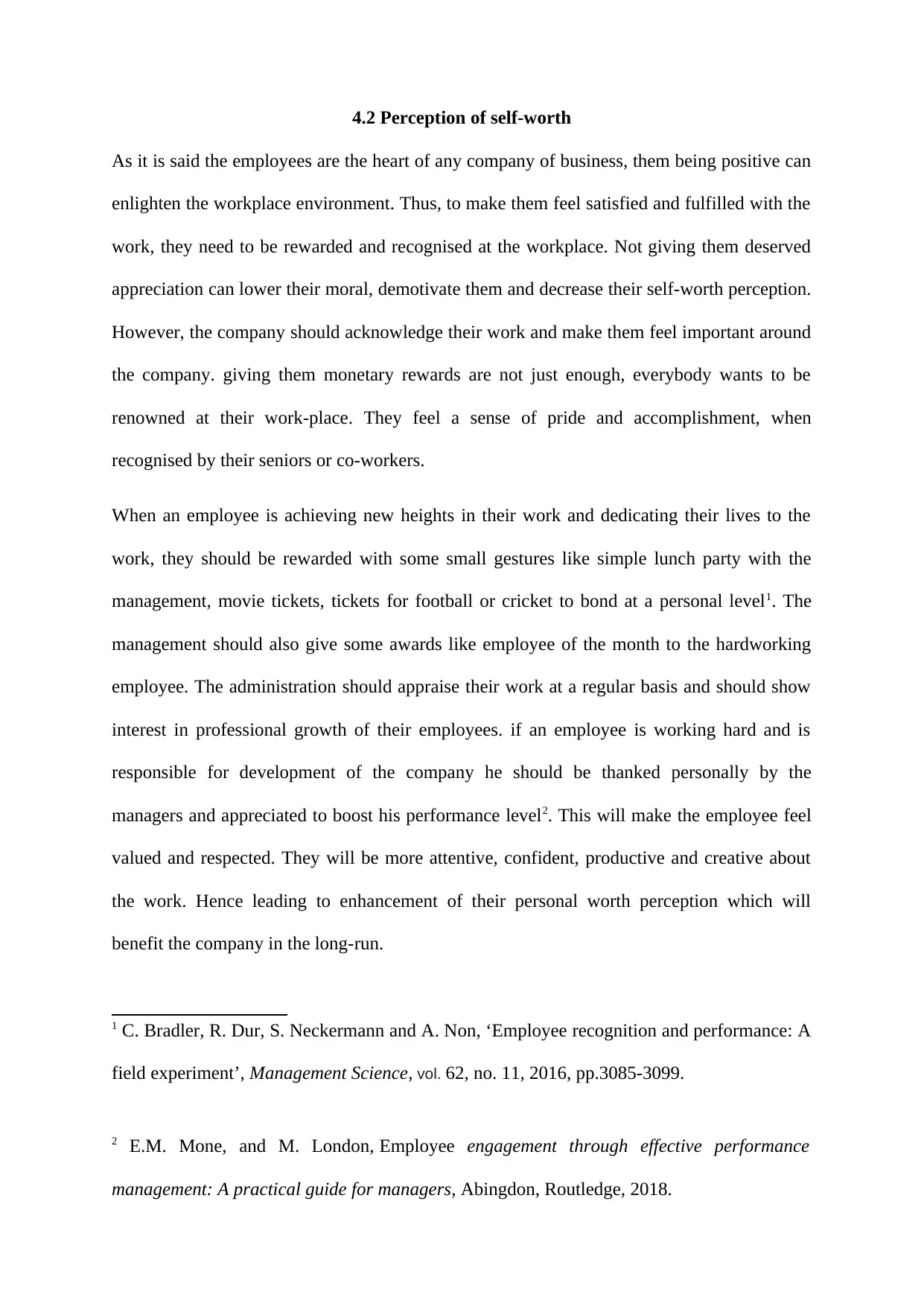
4.2 Perception of self-worth
As it is said the employees are the heart of any company of business, them being positive can
enlighten the workplace environment. Thus, to make them feel satisfied and fulfilled with the
work, they need to be rewarded and recognised at the workplace. Not giving them deserved
appreciation can lower their moral, demotivate them and decrease their self-worth perception.
However, the company should acknowledge their work and make them feel important around
the company. giving them monetary rewards are not just enough, everybody wants to be
renowned at their work-place. They feel a sense of pride and accomplishment, when
recognised by their seniors or co-workers.
When an employee is achieving new heights in their work and dedicating their lives to the
work, they should be rewarded with some small gestures like simple lunch party with the
management, movie tickets, tickets for football or cricket to bond at a personal level1. The
management should also give some awards like employee of the month to the hardworking
employee. The administration should appraise their work at a regular basis and should show
interest in professional growth of their employees. if an employee is working hard and is
responsible for development of the company he should be thanked personally by the
managers and appreciated to boost his performance level2. This will make the employee feel
valued and respected. They will be more attentive, confident, productive and creative about
the work. Hence leading to enhancement of their personal worth perception which will
benefit the company in the long-run.
1 C. Bradler, R. Dur, S. Neckermann and A. Non, ‘Employee recognition and performance: A
field experiment’, Management Science, vol. 62, no. 11, 2016, pp.3085-3099.
2 E.M. Mone, and M. London, Employee engagement through effective performance
management: A practical guide for managers, Abingdon, Routledge, 2018.
As it is said the employees are the heart of any company of business, them being positive can
enlighten the workplace environment. Thus, to make them feel satisfied and fulfilled with the
work, they need to be rewarded and recognised at the workplace. Not giving them deserved
appreciation can lower their moral, demotivate them and decrease their self-worth perception.
However, the company should acknowledge their work and make them feel important around
the company. giving them monetary rewards are not just enough, everybody wants to be
renowned at their work-place. They feel a sense of pride and accomplishment, when
recognised by their seniors or co-workers.
When an employee is achieving new heights in their work and dedicating their lives to the
work, they should be rewarded with some small gestures like simple lunch party with the
management, movie tickets, tickets for football or cricket to bond at a personal level1. The
management should also give some awards like employee of the month to the hardworking
employee. The administration should appraise their work at a regular basis and should show
interest in professional growth of their employees. if an employee is working hard and is
responsible for development of the company he should be thanked personally by the
managers and appreciated to boost his performance level2. This will make the employee feel
valued and respected. They will be more attentive, confident, productive and creative about
the work. Hence leading to enhancement of their personal worth perception which will
benefit the company in the long-run.
1 C. Bradler, R. Dur, S. Neckermann and A. Non, ‘Employee recognition and performance: A
field experiment’, Management Science, vol. 62, no. 11, 2016, pp.3085-3099.
2 E.M. Mone, and M. London, Employee engagement through effective performance
management: A practical guide for managers, Abingdon, Routledge, 2018.
Paraphrase This Document
Need a fresh take? Get an instant paraphrase of this document with our AI Paraphraser
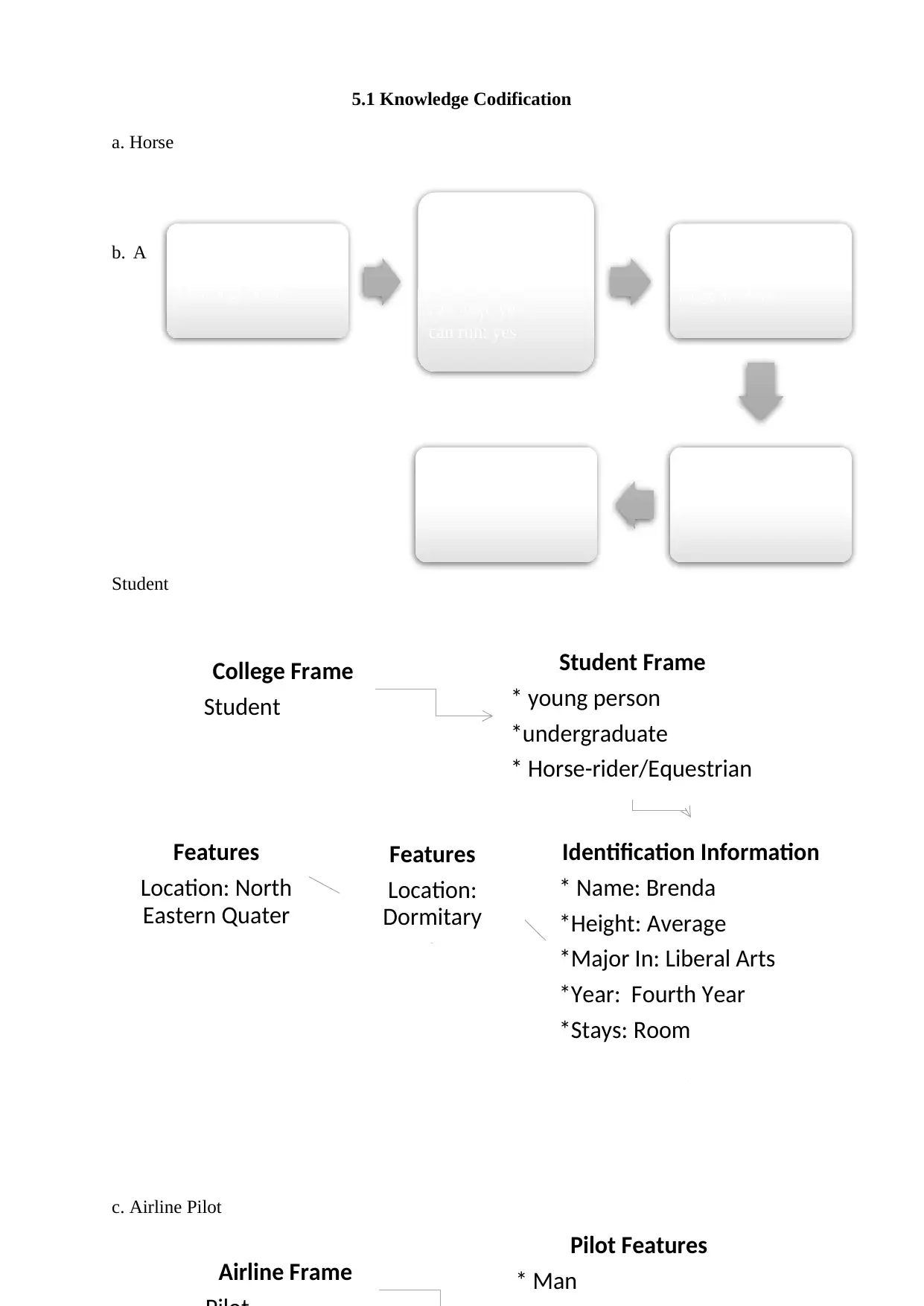
5.1 Knowledge Codification
a. Horse
b. A
Student
c. Airline Pilot
Horse Physique
Families:
Thoroughbred
Frame of
Thoroughbred
is an : animal
is of: 18 hand
can leap: yes
can run: yes
Mini Detail Frame
is a: Thoroughbred
lodge in: stalls
Feature
Location: Stable
Feature
Location: Stud Farm
College Frame
Student
Student Frame
* young person
*undergraduate
* Horse-rider/Equestrian
Identification Information
* Name: Brenda
*Height: Average
*Major In: Liberal Arts
*Year: Fourth Year
*Stays: Room
Features
Location:
Dormitary
Features
Location: North
Eastern Quater
Airline Frame
Pilot Features
* Man
a. Horse
b. A
Student
c. Airline Pilot
Horse Physique
Families:
Thoroughbred
Frame of
Thoroughbred
is an : animal
is of: 18 hand
can leap: yes
can run: yes
Mini Detail Frame
is a: Thoroughbred
lodge in: stalls
Feature
Location: Stable
Feature
Location: Stud Farm
College Frame
Student
Student Frame
* young person
*undergraduate
* Horse-rider/Equestrian
Identification Information
* Name: Brenda
*Height: Average
*Major In: Liberal Arts
*Year: Fourth Year
*Stays: Room
Features
Location:
Dormitary
Features
Location: North
Eastern Quater
Airline Frame
Pilot Features
* Man
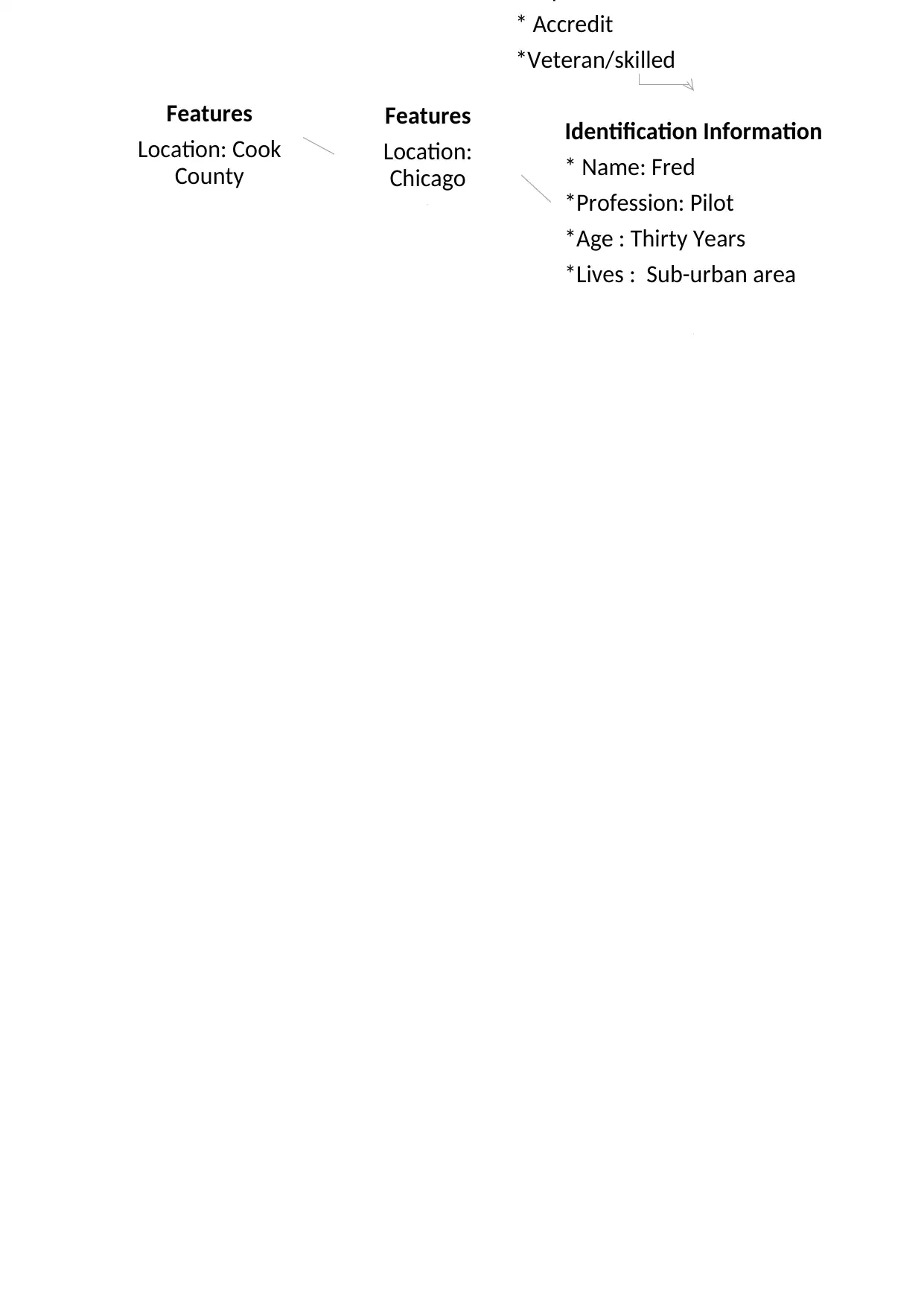
* Accredit
*Veteran/skilled
Identification Information
* Name: Fred
*Profession: Pilot
*Age : Thirty Years
*Lives : Sub-urban area
Features
Location:
Chicago
Features
Location: Cook
County
*Veteran/skilled
Identification Information
* Name: Fred
*Profession: Pilot
*Age : Thirty Years
*Lives : Sub-urban area
Features
Location:
Chicago
Features
Location: Cook
County
⊘ This is a preview!⊘
Do you want full access?
Subscribe today to unlock all pages.

Trusted by 1+ million students worldwide
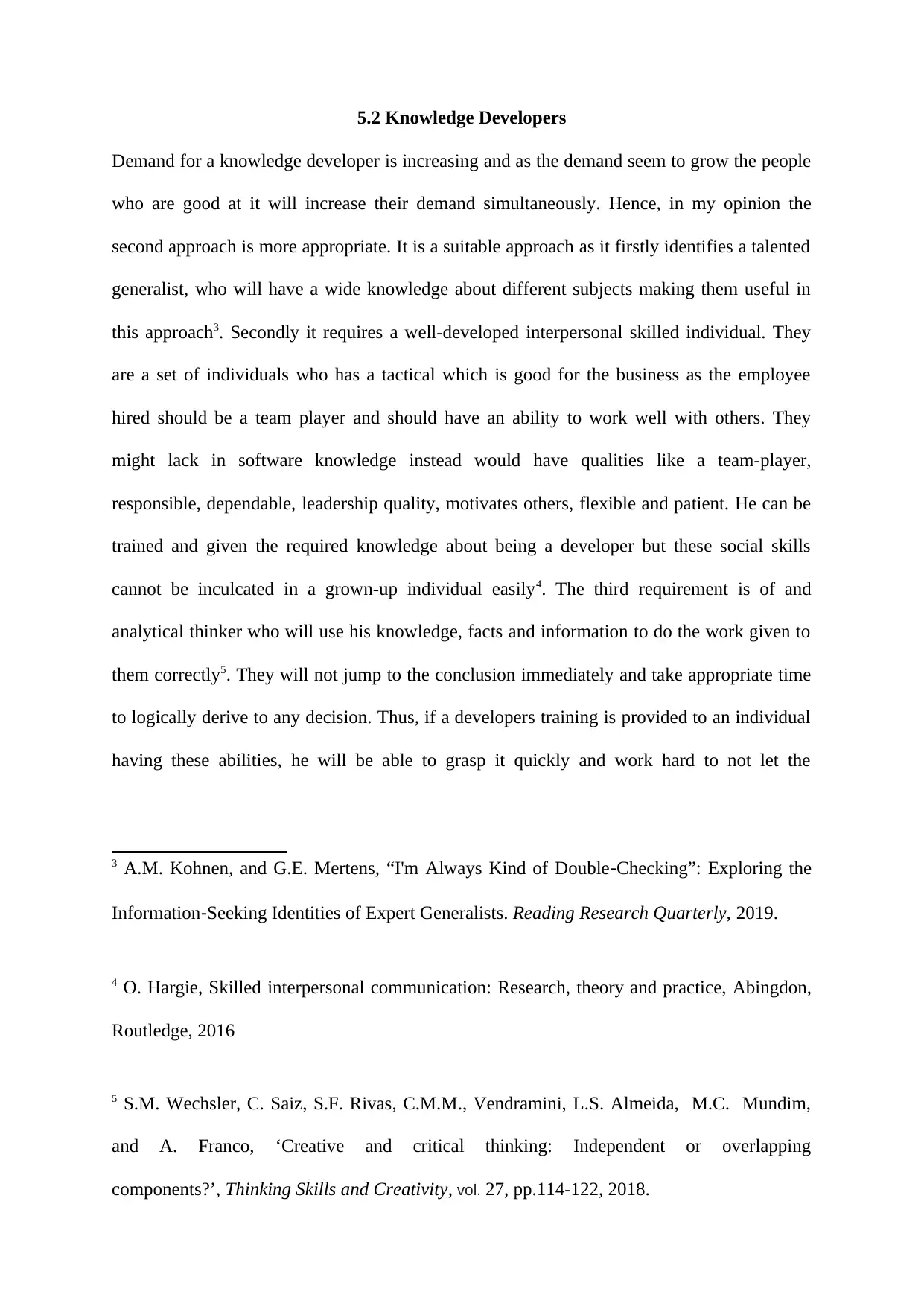
5.2 Knowledge Developers
Demand for a knowledge developer is increasing and as the demand seem to grow the people
who are good at it will increase their demand simultaneously. Hence, in my opinion the
second approach is more appropriate. It is a suitable approach as it firstly identifies a talented
generalist, who will have a wide knowledge about different subjects making them useful in
this approach3. Secondly it requires a well-developed interpersonal skilled individual. They
are a set of individuals who has a tactical which is good for the business as the employee
hired should be a team player and should have an ability to work well with others. They
might lack in software knowledge instead would have qualities like a team-player,
responsible, dependable, leadership quality, motivates others, flexible and patient. He can be
trained and given the required knowledge about being a developer but these social skills
cannot be inculcated in a grown-up individual easily4. The third requirement is of and
analytical thinker who will use his knowledge, facts and information to do the work given to
them correctly5. They will not jump to the conclusion immediately and take appropriate time
to logically derive to any decision. Thus, if a developers training is provided to an individual
having these abilities, he will be able to grasp it quickly and work hard to not let the
3 A.M. Kohnen, and G.E. Mertens, “I'm Always Kind of Double‐Checking”: Exploring the
Information‐Seeking Identities of Expert Generalists. Reading Research Quarterly, 2019.
4 O. Hargie, Skilled interpersonal communication: Research, theory and practice, Abingdon,
Routledge, 2016
5 S.M. Wechsler, C. Saiz, S.F. Rivas, C.M.M., Vendramini, L.S. Almeida, M.C. Mundim,
and A. Franco, ‘Creative and critical thinking: Independent or overlapping
components?’, Thinking Skills and Creativity, vol. 27, pp.114-122, 2018.
Demand for a knowledge developer is increasing and as the demand seem to grow the people
who are good at it will increase their demand simultaneously. Hence, in my opinion the
second approach is more appropriate. It is a suitable approach as it firstly identifies a talented
generalist, who will have a wide knowledge about different subjects making them useful in
this approach3. Secondly it requires a well-developed interpersonal skilled individual. They
are a set of individuals who has a tactical which is good for the business as the employee
hired should be a team player and should have an ability to work well with others. They
might lack in software knowledge instead would have qualities like a team-player,
responsible, dependable, leadership quality, motivates others, flexible and patient. He can be
trained and given the required knowledge about being a developer but these social skills
cannot be inculcated in a grown-up individual easily4. The third requirement is of and
analytical thinker who will use his knowledge, facts and information to do the work given to
them correctly5. They will not jump to the conclusion immediately and take appropriate time
to logically derive to any decision. Thus, if a developers training is provided to an individual
having these abilities, he will be able to grasp it quickly and work hard to not let the
3 A.M. Kohnen, and G.E. Mertens, “I'm Always Kind of Double‐Checking”: Exploring the
Information‐Seeking Identities of Expert Generalists. Reading Research Quarterly, 2019.
4 O. Hargie, Skilled interpersonal communication: Research, theory and practice, Abingdon,
Routledge, 2016
5 S.M. Wechsler, C. Saiz, S.F. Rivas, C.M.M., Vendramini, L.S. Almeida, M.C. Mundim,
and A. Franco, ‘Creative and critical thinking: Independent or overlapping
components?’, Thinking Skills and Creativity, vol. 27, pp.114-122, 2018.
Paraphrase This Document
Need a fresh take? Get an instant paraphrase of this document with our AI Paraphraser
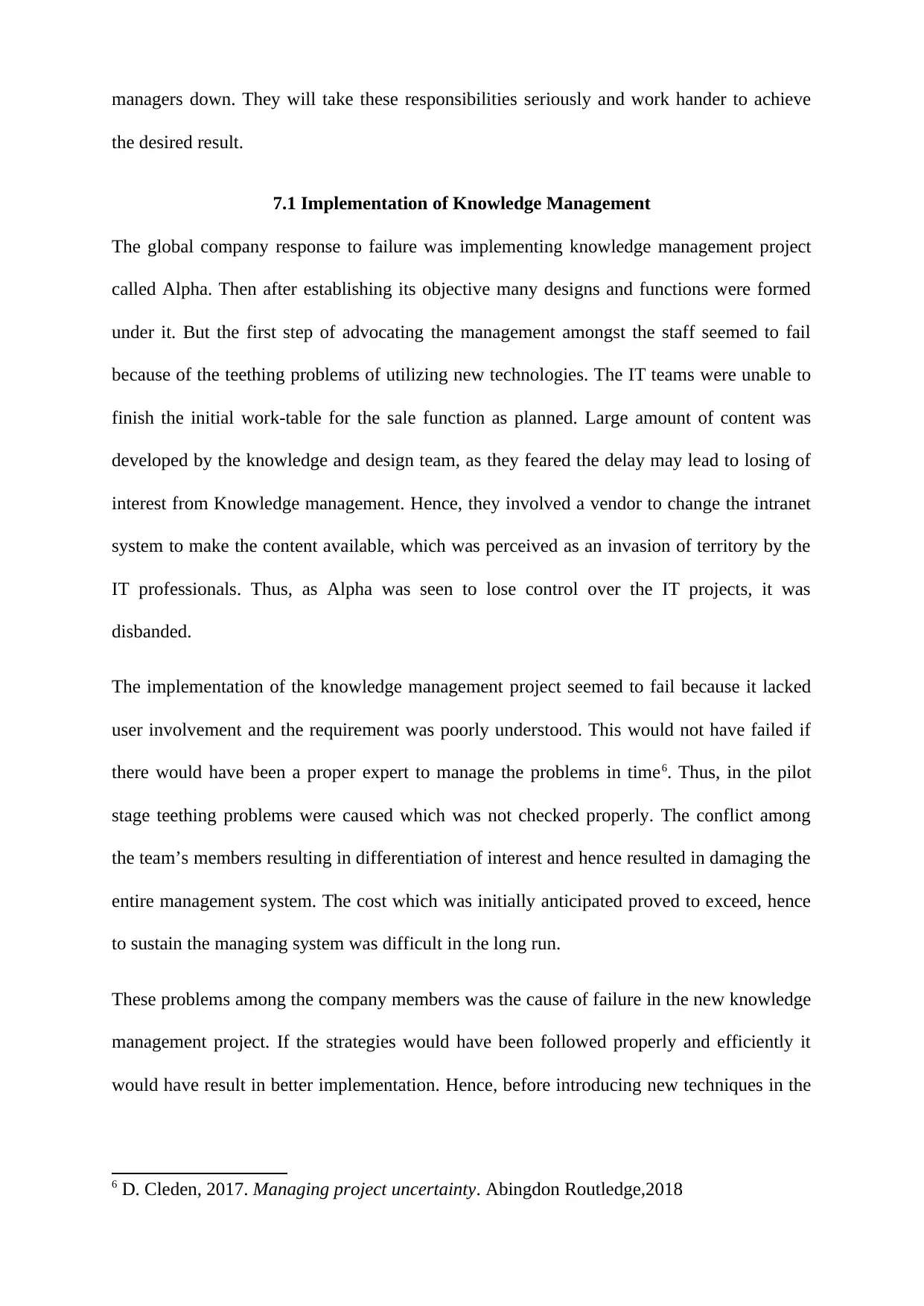
managers down. They will take these responsibilities seriously and work hander to achieve
the desired result.
7.1 Implementation of Knowledge Management
The global company response to failure was implementing knowledge management project
called Alpha. Then after establishing its objective many designs and functions were formed
under it. But the first step of advocating the management amongst the staff seemed to fail
because of the teething problems of utilizing new technologies. The IT teams were unable to
finish the initial work-table for the sale function as planned. Large amount of content was
developed by the knowledge and design team, as they feared the delay may lead to losing of
interest from Knowledge management. Hence, they involved a vendor to change the intranet
system to make the content available, which was perceived as an invasion of territory by the
IT professionals. Thus, as Alpha was seen to lose control over the IT projects, it was
disbanded.
The implementation of the knowledge management project seemed to fail because it lacked
user involvement and the requirement was poorly understood. This would not have failed if
there would have been a proper expert to manage the problems in time6. Thus, in the pilot
stage teething problems were caused which was not checked properly. The conflict among
the team’s members resulting in differentiation of interest and hence resulted in damaging the
entire management system. The cost which was initially anticipated proved to exceed, hence
to sustain the managing system was difficult in the long run.
These problems among the company members was the cause of failure in the new knowledge
management project. If the strategies would have been followed properly and efficiently it
would have result in better implementation. Hence, before introducing new techniques in the
6 D. Cleden, 2017. Managing project uncertainty. Abingdon Routledge,2018
the desired result.
7.1 Implementation of Knowledge Management
The global company response to failure was implementing knowledge management project
called Alpha. Then after establishing its objective many designs and functions were formed
under it. But the first step of advocating the management amongst the staff seemed to fail
because of the teething problems of utilizing new technologies. The IT teams were unable to
finish the initial work-table for the sale function as planned. Large amount of content was
developed by the knowledge and design team, as they feared the delay may lead to losing of
interest from Knowledge management. Hence, they involved a vendor to change the intranet
system to make the content available, which was perceived as an invasion of territory by the
IT professionals. Thus, as Alpha was seen to lose control over the IT projects, it was
disbanded.
The implementation of the knowledge management project seemed to fail because it lacked
user involvement and the requirement was poorly understood. This would not have failed if
there would have been a proper expert to manage the problems in time6. Thus, in the pilot
stage teething problems were caused which was not checked properly. The conflict among
the team’s members resulting in differentiation of interest and hence resulted in damaging the
entire management system. The cost which was initially anticipated proved to exceed, hence
to sustain the managing system was difficult in the long run.
These problems among the company members was the cause of failure in the new knowledge
management project. If the strategies would have been followed properly and efficiently it
would have result in better implementation. Hence, before introducing new techniques in the
6 D. Cleden, 2017. Managing project uncertainty. Abingdon Routledge,2018
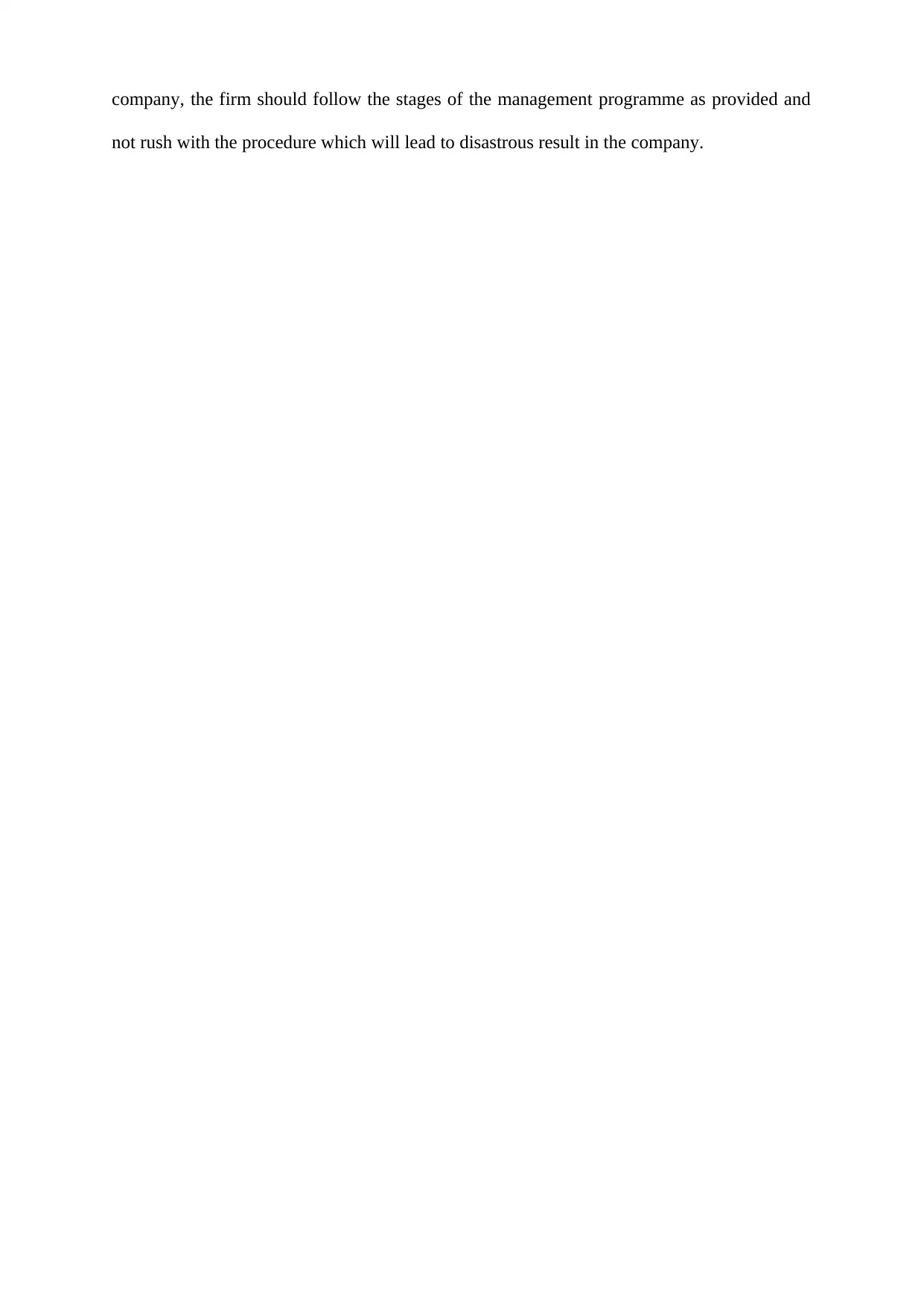
company, the firm should follow the stages of the management programme as provided and
not rush with the procedure which will lead to disastrous result in the company.
not rush with the procedure which will lead to disastrous result in the company.
⊘ This is a preview!⊘
Do you want full access?
Subscribe today to unlock all pages.

Trusted by 1+ million students worldwide
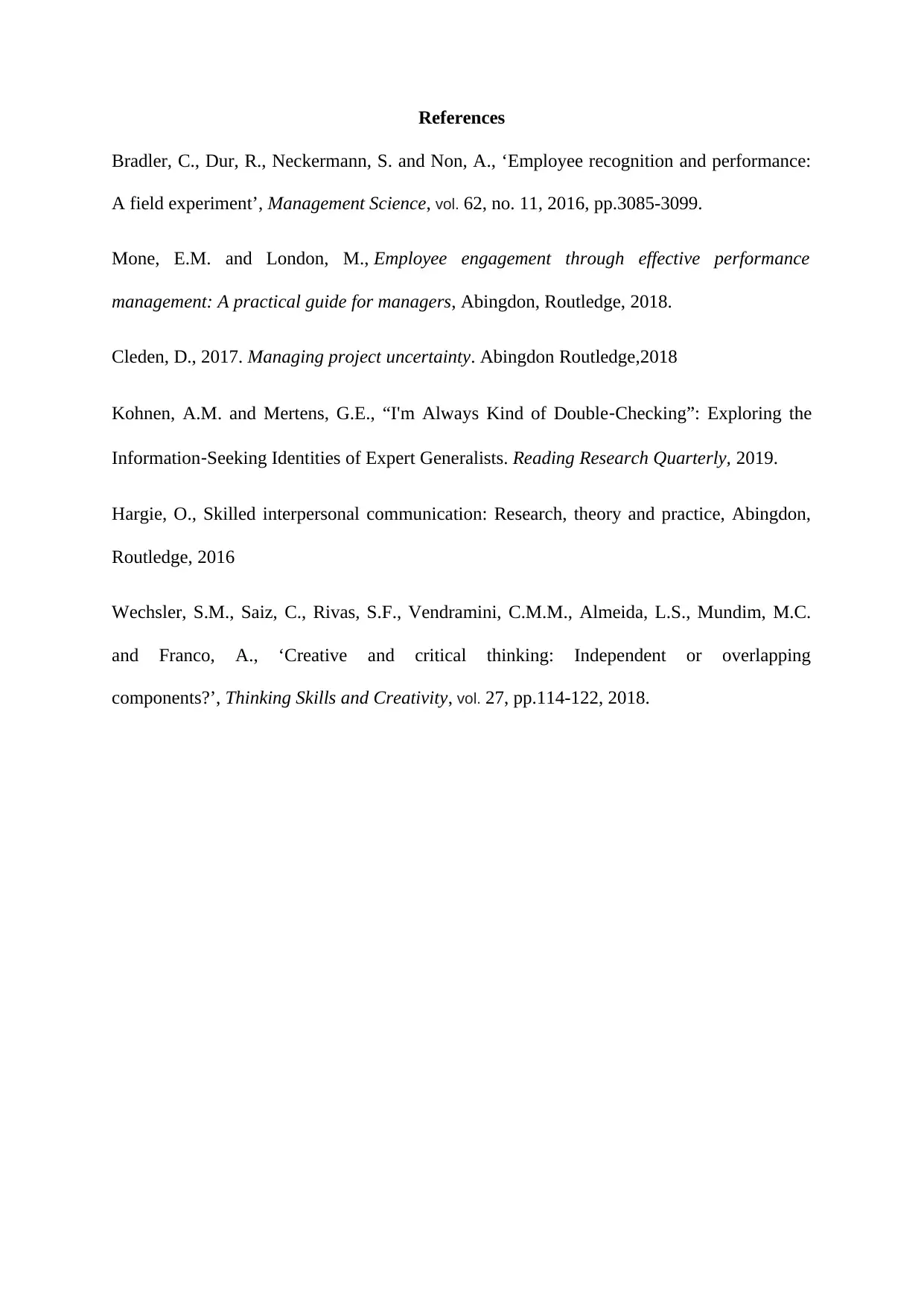
References
Bradler, C., Dur, R., Neckermann, S. and Non, A., ‘Employee recognition and performance:
A field experiment’, Management Science, vol. 62, no. 11, 2016, pp.3085-3099.
Mone, E.M. and London, M., Employee engagement through effective performance
management: A practical guide for managers, Abingdon, Routledge, 2018.
Cleden, D., 2017. Managing project uncertainty. Abingdon Routledge,2018
Kohnen, A.M. and Mertens, G.E., “I'm Always Kind of Double‐Checking”: Exploring the
Information‐Seeking Identities of Expert Generalists. Reading Research Quarterly, 2019.
Hargie, O., Skilled interpersonal communication: Research, theory and practice, Abingdon,
Routledge, 2016
Wechsler, S.M., Saiz, C., Rivas, S.F., Vendramini, C.M.M., Almeida, L.S., Mundim, M.C.
and Franco, A., ‘Creative and critical thinking: Independent or overlapping
components?’, Thinking Skills and Creativity, vol. 27, pp.114-122, 2018.
Bradler, C., Dur, R., Neckermann, S. and Non, A., ‘Employee recognition and performance:
A field experiment’, Management Science, vol. 62, no. 11, 2016, pp.3085-3099.
Mone, E.M. and London, M., Employee engagement through effective performance
management: A practical guide for managers, Abingdon, Routledge, 2018.
Cleden, D., 2017. Managing project uncertainty. Abingdon Routledge,2018
Kohnen, A.M. and Mertens, G.E., “I'm Always Kind of Double‐Checking”: Exploring the
Information‐Seeking Identities of Expert Generalists. Reading Research Quarterly, 2019.
Hargie, O., Skilled interpersonal communication: Research, theory and practice, Abingdon,
Routledge, 2016
Wechsler, S.M., Saiz, C., Rivas, S.F., Vendramini, C.M.M., Almeida, L.S., Mundim, M.C.
and Franco, A., ‘Creative and critical thinking: Independent or overlapping
components?’, Thinking Skills and Creativity, vol. 27, pp.114-122, 2018.
1 out of 7
Related Documents
Your All-in-One AI-Powered Toolkit for Academic Success.
+13062052269
info@desklib.com
Available 24*7 on WhatsApp / Email
![[object Object]](/_next/static/media/star-bottom.7253800d.svg)
Unlock your academic potential
Copyright © 2020–2026 A2Z Services. All Rights Reserved. Developed and managed by ZUCOL.




